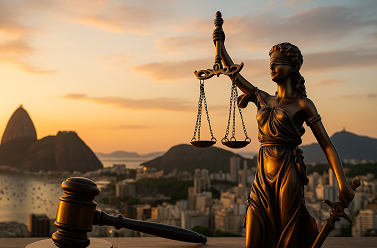Rio de Janeiro
Av. Presidente Wilson, 231 / Salão 902 Parte - Centro
CEP 20030-021 - Rio de Janeiro - RJ
+55 21 3942-1026

Brazil’s criminal justice system blends civil‑law codes with adversarial reforms, granting defendants robust procedural rights alongside expansive prosecutorial powers. A skilled criminal defense lawyer safeguards liberty by mastering police investigation rules, evidence challenges, and strategic negotiations. This guide explains every stage—from arrest to appeal—equipping readers with practical knowledge to navigate Brazil’s courts.
The Federal Constitution enshrines due process, presumption of innocence, and habeas corpus. The Penal Code defines offenses, while the Code of Criminal Procedure (CPP) establishes investigative and trial procedures. Complementary laws address money laundering, cybercrime, and organized crime, each with unique evidentiary standards.
1. Police Inquiry (Inquérito Policial): Police gather evidence under prosecutor supervision. Defense lawyers may request diligence and attend interrogations.
2. Prosecution (Denúncia): The Public Ministry files charges if evidence suffices.
3. Preliminary Hearing: Judge receives plea, sets precautionary measures.
4. Evidentiary Phase: Witnesses, experts, and documents presented.
5. Closing Arguments and Judgment.
6. Appeals to State Courts (TJ/TRF) and Superior Courts (STJ, STF).
Brazil abolished cash bail for most crimes; judges imposed precautionary conditions, such as periodic court check‑ins, passport surrenders, and ankle monitors. Habeas corpus challenges excessive detention.
Illicitly obtained evidence (e.g., warrantless phone taps) is inadmissible and contaminates derivative proof. Defense can file motions to suppress and request chain‑of‑custody audits.
Law 12.850 allows plea deals for organized crime; Law 9.613 covers money laundering. Defense attorneys negotiate sentence reductions, immunity, or semi‑open regimes in exchange for truthful collaboration.
Crimes against life (homicide, infanticide, abortion) go before a lay jury. Lawyers craft persuasive narratives and preempt juror biases during voir dire.
Judges weigh culpability, motive, and prior record. Penalties range from fines to over 30 years imprisonment. Semi‑open and open regimes enable work release or home detention after sentence progression.
Defense may file an appeal on merits, rescission actions, revisión criminal review, and constitutional complaints to the STF for fundamental rights violations.
Brazil cooperates via MLATs and Interpol red notices. Defense challenges extradition by proving political motivation or risk of human rights abuse abroad.
Marco Civil and LGPD impose data duties. Lawyers contest IP address attribution, spoofing, and jurisdiction to protect clients from hacking and data‑leak prosecutions.
Complex economic crimes require forensic accounting and parallel administrative negotiations with the CVM or Central Bank to mitigate penalties.
Defense monitors sentence calculation, good‑time credits, and requests progression after serving the statutory fractions.
Preventive consultation helps corporations avoid criminal liability by implementing compliance programs compliant with the Clean Company Act and anti‑corruption guidelines.
• Delaying forensic expert requests
• Ignoring digital chain of custody
• Overlooking preventive habeas corpus
• Failing to negotiate plea concessions early.
Counsel acts as strategist, negotiator, and human rights guardian—scrutinizing evidence, advocating bail, and maintaining client dignity throughout proceedings.
Brazil’s criminal procedure is intricate but navigable with tactical expertise. An experienced criminal defense lawyer turns constitutional guarantees into concrete courtroom victories, preserving freedom and reputation.
Q: Can I remain silent during a police inquiry?
A: Yes, the Constitution guarantees silence without inference of guilt.
Q: How long can police hold me without charge?
A: Up to 24 hours for flagrant arrest; the judge must validate detention.
Q: Is plea bargaining available for all crimes?
A: Primarily for organized and economic crimes; homicide cases rarely qualify.
Q: Do I get a jury for fraud charges?
A: No, jury trials are limited to crimes against life.
Q: Are phone chats admissible?
A: Only with prior judicial authorization; otherwise, evidence is void.
Q: Can foreign nationals post bail?
A: Brazil uses precautionary measures, such as legal stay and residence proof, to help secure freedom.
Q: What is habeas corpus?
A: A summary remedy challenging illegal detention or coercion.
Q: How soon can I appeal a conviction?
A: Within five business days after judgment publication.
Q: Does confession reduce the sentence?
A: Early confession can lower the baseline by up to one‑sixth.
Q: Are convictions public?
A: Yes, but sealing may apply for rehabilitated offenders.
Q: Can electronic evidence be forged?
A: Defense experts examine metadata to reveal tampering.
Q: What is a semi‑open regime?
A: Inmates work outside during the day, returning to prison at night.
Q: Is house arrest possible?
A: Yes, for sentences ≤ four years or health/vulnerability factors.
Q: Are plea agreements public?
A: They become part of the case file, though classified sections exist.
Q: Can I sue the police for abuse?
A: Yes, civil damages and disciplinary actions are available.
Q: How long does a criminal record last?
A: Indefinite, but rehabilitation clears some effects after five years.
Q: Do bribery allegations go to federal court?
A: Yes, if involving federal funds or officials.
Q: What is restorative justice?
A: Community‑based agreements repairing harm are used in juvenile and minor cases.
Q: Can extradition be refused?
A: Yes, if sentencing abroad exceeds the Brazilian maximum or the offense is political.
Q: Do I need an interpreter in court?
A: Courts must provide interpreters for non‑Portuguese speakers.
For further details, send an email to: [email protected]
 Mr. Alessandro Jacob speaking about Brazilian Law on "International Bar Association" conference
Mr. Alessandro Jacob speaking about Brazilian Law on "International Bar Association" conference Av. Presidente Wilson, 231 / Salão 902 Parte - Centro
CEP 20030-021 - Rio de Janeiro - RJ
+55 21 3942-1026
Travessa Dona Paula, 13 - Higienópolis
CEP -01239-050 - São Paulo - SP
+ 55 11 3280-2197